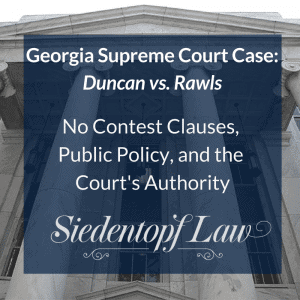[Update, May 2023: As a result of the June 30, 2022 decision by the The Supreme Court of Georgia, Fourth Division, in the case of Giller et al. v. Slosberg the Supreme Court granted the Writ of Certiorari in Duncan II and subsequently vacated the decision by the Court of Appeals and remanded the case to be reconsidered in light of the Slosberg decision.
The Court of Appeals has reconsidered its decision in light of the findings in Slosberg. On March 29, 2023, it has affirmed in part the trial court’s decision that respondents’ breach-of-fiduciary-duty claim failed as a matter of law, as Slosberg in no way addresses that ruling, and remanded in part to the extent those decisions suggest that an in-terrorem provision bars any claim challenging the validity of a trust or will, and has sent the case back to the trial court for a decision consistent with the findings in Slosberg.]
[Update, October 2018: The Georgia Supreme Court denied the Certiorari Petition in the case, meaning that the Georgia Supreme Court will not review the lower court’s ruling and that Georgia Court of Appeals’ decision stands. The Court has not taken this opportunity to adopt a good faith and probable cause exception to the In Terrorem Clause (AKA No Contest Clause).]
The Georgia Supreme Court is scheduled to hear the Duncan vs. Rawls case this summer. The Court’s decision could have a significant and long-lasting effect on how No Contest or In Terrorem Clauses function in estate planning, and how Georgia courts are able to interpret and enforce these clauses.
This summer, the state’s top court is scheduled to hear a case that could change the interpretation and impact of No Contest Clauses. A No Contest Clause, also known as an In Terrorem Clause, is a provision in a person’s will designed to dissuade beneficiaries from legally challenging that will. The idea is, if a beneficiary takes legal action and tries to challenge or void the will, he or she will be disinherited and no longer have any rights to the assets left to them in the will.
A No Contest Clause is one of the primary issues in Duncan vs. Rawls, which the Georgia Supreme Court is scheduled to hear in August 2018. The facts of the case are as follows: In 2012, Mrs. Goizueta executed a durable power of attorney that gave her children the authority to create, revoke, or amend any trust for her benefit and to act as trustees. In February 2013, Mrs. Goizueta amended her trust – naming her children as trustees, providing monetary gifts for her staff and employees, and including an In Terrorem Clause that those who directly contest her will or trust would forfeit those gifts. One month later, in March 2013, Mrs. Goizueta amended the trust again to reduce the amount of the monetary gifts to her staff and employees. In August 2013, Mrs. Goizueta once again amended the trust to eliminate the staff and employees’ monetary gifts altogether.
When Mrs. Goizueta died in November 2015, her trustees distributed some of the monetary gifts – but in lesser amounts. The beneficiaries sent a letter to the trustees, asking for full distribution as per the terms of the February 2013 version of the trust. The trustees responded by asking the trial court for a declaratory judgment; they argued that the beneficiaries’ letter violated the trust’s In Terrorem Clause, and that the staff’s monetary gifts should be forfeited. The beneficiaries responded by claiming that the August 2013 version of the trust is not valid, because Mrs. Goizueta amended the trust while under “undue influence” (a valid legal contest to any will or trust). The beneficiaries also asked the trial court to adopt a “good faith and probable cause” exception to the enforcement to the In Terrorem Clause in Mrs. Goizueta’s trust.
Both the trial court and the Georgia Court of Appeals court declined the beneficiaries’ request to adopt a good faith and probable cause exception to the In Terrorem Clause, citing that there was no such precedent in Georgia Law or the Georgia Trust Code, and that only the Georgia General Assembly could decide such public policy. So now, the Georgia Supreme Court is left to rule on a number of issues relevant to trusts and estate planning:
- Do Georgia Courts have the authority to determine public policy, or does the Georgia General Assembly have the sole authority to determine public policy?
- What about the legal precedent that Georgia courts do have the power to establish public policy where the need and principle involved is “clear and convincing”?
- Does an In Terrorem Clause strip Georgia Courts of all authority to remedy fraudulent or unlawful activity (such as undue influence)?
- How should Georgia courts interpret In Terrorem Clauses? Should it be a strict interpretation (by the exact words used) or should the court also consider the testator’s purpose in including the In Terrorem Clause?
The Duncan vs. Rawls case could have a significant and long-lasting effect on how No Contest or In Terrorem Clauses function in estate planning, and how Georgia courts are able to interpret and enforce these clauses. Siedentopf Law is following this case closely and will share any updates. In the meantime, if you have any additional questions about probate and No Contest Clauses, you can contact us at (404) 736-6066 or visit our website EstateLawAtlanta.com. You can also read our previous blog, No Contest Clauses: Understanding the Pros and Cons.
© Sarah Siedentopf and Siedentopf Law, 2018. Unauthorized use and/or duplication of this material without express and written permission from this site’s author and/or owner is strictly prohibited. Excerpts and links may be used, provided that full and clear credit is given to Siedentopf Law and EstateLawAtlanta.com with appropriate and specific direction to the original content.








